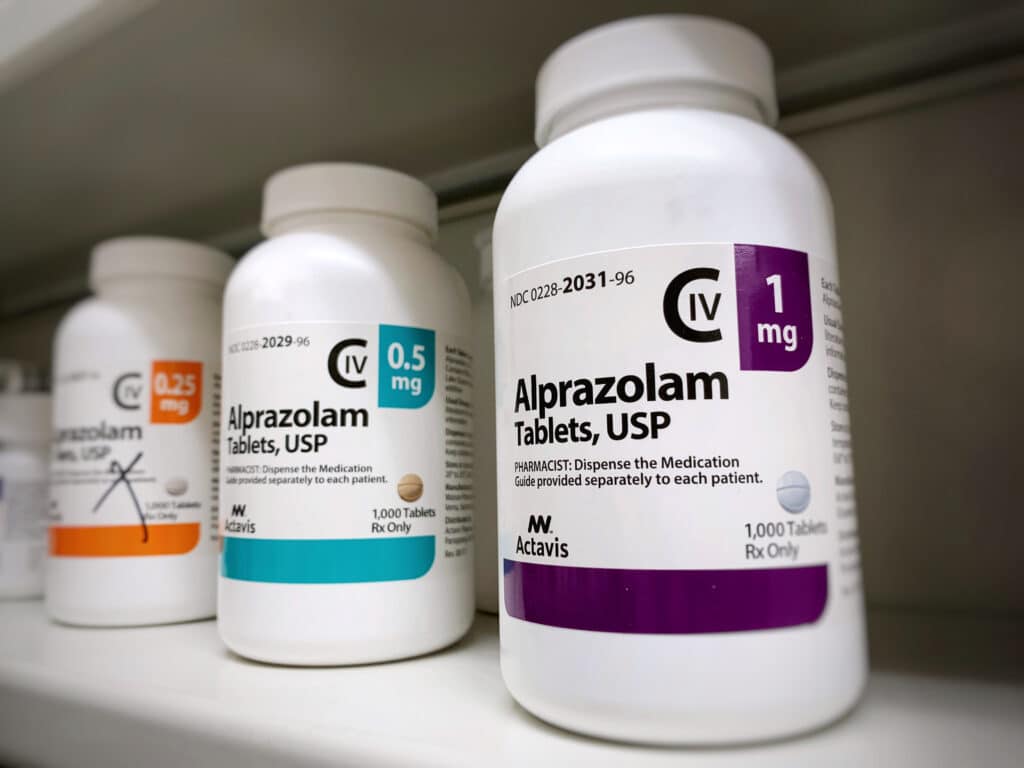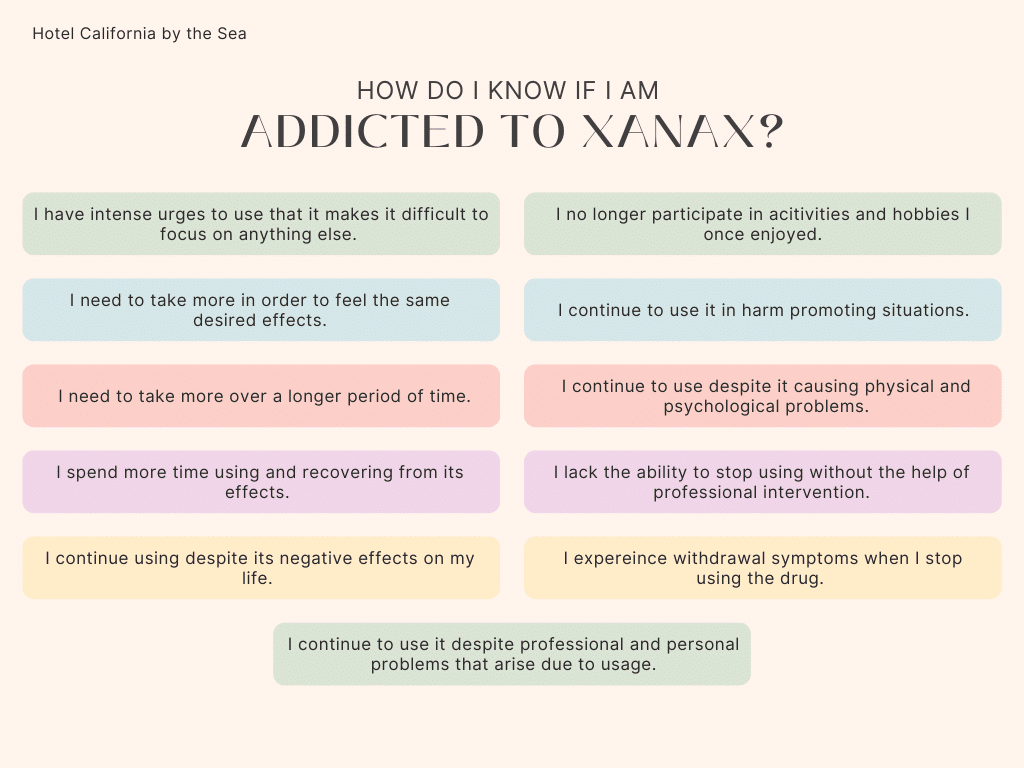Are you Addicted to Xanax?
Xanax, Klonopin, Ativan and Valium are some of the most popularly prescribed benzodiazepines in the U.S.. In fact, Xanax is the number one psychiatric medication prescribed by medical providers. In 2013, Xanax accounted for more than 48 million prescriptions filled.
Why is Xanax so addictive? And how do I know if I am addicted to Xanax?
What is Xanax?
Xanax is a controlled substance. Doctors often prescribe benzos to help treat symptoms of anxiety, panic disorder, and sleep disorders. It can also help with stress and sleep issues. It calms the nervous system and helps patients feel more relaxed and at ease.
The body rapidly absorbs Xanax into the bloodstream, which makes it effective almost immediately. It has high potency and is highly addictive. Severe withdrawal symptoms can occur even after short-term use.

Symptoms and Side Effects of Xanax
- Intense relaxation
- Euphoria
- Shifts in mood or irritability
- Dizziness
- Dry mouth
- Fatigue
- Nausea and vomiting
- Poor sense of coordination
- Development of seizures
- Shortness of breath
- Slurred speech
- Tremors
- Inability to focus
- Confusion and memory impairment
- Lack of inhibition
Like many types of benzos, Xanax also comes with a black box label warning due to its highly addictive properties. However, taking benzos as prescribed can still lead to dependence and addiction. Many believe that because a doctor has prescribed it, it cannot be harmful. Unfortunately, even when prescribed, it can become highly addictive both physically and psychologically.

Why is Xanax so Addictive?
Benzos addiction such as an addiction to Xanax is an often less recognized drug problem. More and more anti-depressant and anti-anxiety medications are being grossly overprescribed. This is especially common in our society today, in the post covid-19 pandemic era. This has caused physical harm and also led to widespread psychological damage, affecting both the elderly and young people.
Wider prescribing has made substances like Xanax more accessible and affordable to the public. People should use potent benzos like Xanax only for a short time and alongside other types of treatment. However, medical providers and physicians are now allowing patients to use them over longer periods. Overuse only increases the risk of developing an addiction.
Xanax works by attaching to the GABA receptors in your brain. It increases the amount of GABA on your receptors, which promotes feelings of calm and relaxation. Once the medication enters the body, it can begin working to relieve symptoms within 1 to 2 hours.
However, because it is a short-acting benzo, the effects of the medication wear off as quickly as they started. This makes the user feel the need to use more and more to achieve a sense of calm.
Using more drugs over time to feel the same effect increases the risk of dependency on the brain and body. The brain is no longer able to naturally produce relaxing feelings without the help of drugs. Taking high doses of Xanax long-term can lead to addiction.
How do I know if I am Addicted to Xanax?
- You have urges and cravings for Xanax that are so intense it is difficult to focus on anything else
- You need to take more Xanax in order to feel and achieve the same desired effects
- You begin taking more Xanax for longer periods of time than prescribed and intended
- You spend a lot of time to obtaining Xanax and recovering from its effects
- You continue to use it even though it affects your ability at work and your personal life
- You continuing to use Xanax despite professional, personal and social problems that arise due to usage
- You give up important activities or hobbies you once enjoyed
- You continue to use Xanax in harm-promoting situations
- You continue to use Xanax despite it causing physical and psychological problems
- You lack the ability to stop using Xanax without the assistance of professional intervention
- You experience intense symptoms of withdrawal once you stop using Xanax
Check Your Insurance Coverage for FREE
Find out if your insurance covers addiction treatment in minutes. We accept most insurance!
Xanax Detox: What You Should Know
Xanax is a controlled substance that works by slowing activity in the central nervous system. When used in higher doses or over a long term, it can lead to physical and psychological dependence. As a result, detoxing from Xanax often becomes a challenging and potentially dangerous process. The danger comes from the risk of severe withdrawal symptoms.
Xanax withdrawal is not just uncomfortable- in some cases, it can be life threatening. Symptoms may include shaking, sweating, anxiety, and seizures. Some people also feel confused or experience intense mood swings.
A slow and supervised detox is the safest way to stop using Xanax. Health providers can create a tapering schedule that lowers the dose over time. This helps the body adjust and reduces the chance of severe withdrawal.
Experts never advise detoxing alone or stopping cold turkey. It can lead to medical emergencies and worsen symptoms of mental illness.
People who take large amounts of Xanax over a long term often need extra care during detox. Their brains have adapted more deeply to the drug, which can make the withdrawal process harder and more intense. Support from trained professionals is crucial for a safe and effective detox. Medical teams can monitor vital signs and respond to any complications.
Detox is only the first step in recovering from a Xanax addiction. After the body is clear of the drug, the brain still needs time to heal. Ongoing treatment can help with anxiety, depression, and other mental health concerns. Many people benefit from therapy or medication that is safer for long-term use.
What is the difference between Xanax and Ativan?
Both Xanax and Ativan are benzos medications used to treat a variety of anxiety, sleep and panic disorders. They are similar in many ways, but also have distinct differences.
Xanax works quickly to relieve symptoms. Ativan can take up to two hours to be effective. Because Xanax begins to work quickly in the body, its effects do not last for as long. Ativan’s effects tend to have a longer shelf life and allow for a longer duration of relief in symptoms.
Doctors often see Ativan as a safer benzo because it works more slowly and stays in the body longer. This reduces its potential for addiction compared to Xanax.
Some of the side effects of both medications can also slightly differ. Xanax users usually experience slurred speech, mood changes, and appetite changes. Whereas, in Ativan, these symptoms are much less common. When using either of these medications, it is best to use them only as prescribed by a physician and for short-term treatments only.
Ways you can help manage your Anxiety
- Exercise: Regular exercise helps improve both physical and mental health. Physical activities often help increase the production of mood-enhancing hormones called endorphins. This will help you feel less stressed and have a more positive outlook.
- Nutrition: Maintaining a healthy food diet with nutrient-dense meals can help fight off physical and psychological ailments. The macronutrients and micronutrients you receive from foods help to regulate and reduce symptoms of stress and depression.
- Mindfulness and Meditation: Practicing mindfulness and meditation can help reduce stress and anxiety. Deep breathing and muscle relaxation can help ease the mind which can help turn negative thoughts into positive affirmations.
- Reduce Caffeine and Alcohol intake: Caffeine is a stimulant and alcohol is a depressant. Too much of these substances can upset the balance in the brain, leading to overactive or under-active brain activity.
- Develop better sleeping habits: Sleep is an important part of healing both the mind and body. Creating a better sleep routine can help you sleep faster, sleep longer and sleep more deeply. This results in lower anxiety, lower stress and overall better physical health. Your brain and body are able to repair and reset during your sleep.
- Get help and support: If your symptoms feel too hard to manage, getting help and support can make it easier to treat them. Therapists and other behavioral health specialists can assist in treating your anxiety.
Reach out to Hotel California by the Sea
We specialize in treating addiction and other co-occurring disorders, such as PTSD. Our Admissions specialists are available to walk you through the best options for treating your addiction.
Research indicates benzos like Xanax link to about one-third of prescription drug overdose deaths. Xanax is often combined with other prescription medications such as opioids. This can lead to a deadly combination resulting in overdose and death.
Professional behavioral healthcare providers, such as Hotel California by the Sea, offer the experience needed to support recovery. They provide the care required to help people who may be struggling with a benzos addiction.
Our benzos addiction treatment program provides a wide range of treatment options. This includes all levels of care such as medical detox, residential treatment, partial hospitalization programming and intensive outpatient programming. Throughout each level of care, clients will receive options for medication management and intensive therapies.
Unique therapies such as CBT, DBT and EMDR therapy have shown evidence-based success in treating addiction. They are also effective in helping people manage co-occurring mental health disorders. Hotel California by the Sea specializes in creating individualized treatment plans for each client based on their needs.
References:
Https://www.verywellhealth.com/ativan-vs-alprazolam-7487743
https://www.verywellmind.com/xanax-addiction-4129043
https://www.healthline.com/health/addiction/xanax-addiction
https://www.ncbi.nlm.nih.gov/pmc/articles/PMC5846112/
https://medlineplus.gov/druginfo/meds/a684001.html
https://www.healthline.com/health-news/the-other-prescription-drug-problem-benzos
